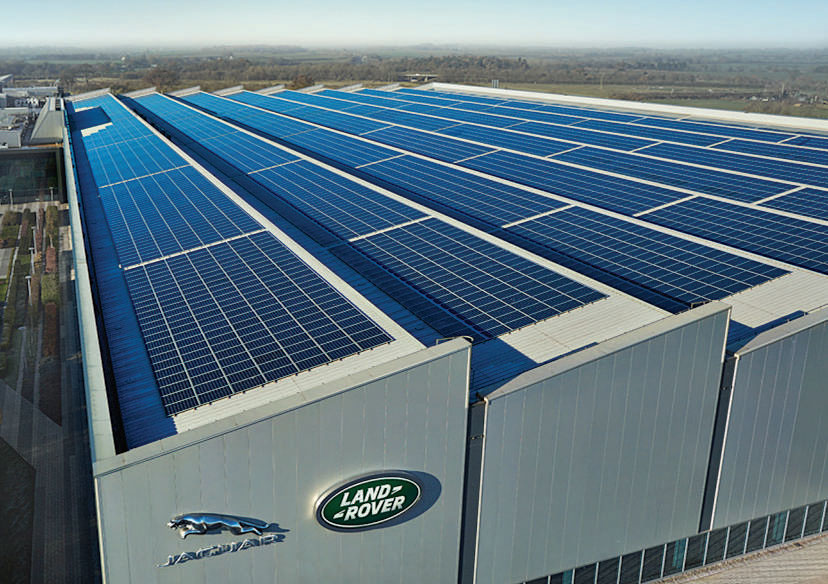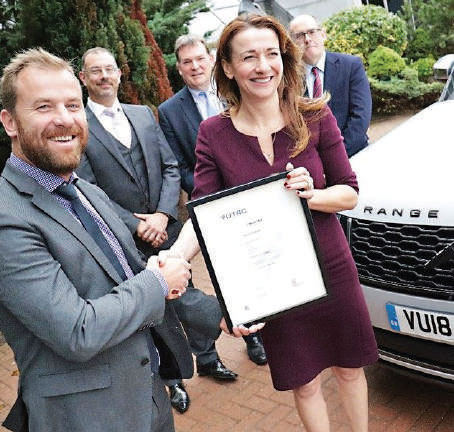TATA MOTORS
ANNUAL REPORT
2019-2020
Environmental Responsibility
Jaguar Land Rover
JLR continues to purchase 100% REGO Renewable Energy Guarantee of Origin (REGO)-backed zero carbon electricity for all core UK operations. In addition, energy-saving projects such as solar panels and LED lighting have made consistent reductions in actual consumption. JLR also uses renewable-generated electricity across its facilities in Slovakia, Brazil and Austria. In September 2019, JLR unveiled world-leading facilities at its Gaydon site in Warwickshire, building one of the UK’s most sustainable non-domestic buildings and the country’s largest automotive creation and development centre.
The Gaydon site forms an integral part of JLR's Destination Zero mission and up to 20% of the energy to run its new Advanced Product Creation Centre comes from 2,800 m2 of photovoltaic solar panels on the roof. The remainder of the site's electricity is derived from 100% renewable sources. In the UK, JLR's operating CO2 emissions are down 71% versus a baseline taken in 2007, and this includes the purchase of REGObacked electricity. Moreover, the average amount of energy used to build one of JLR's vehicles has reduced by 33% since 2007.

Achieving carbon neutrality
A landmark of JLR’s Destination Zero journey is achieving and maintaining its carbon neutral status. The culmination of a long-term environmental management plan launched in 2009, JLR was certified on January 31, 2020 as achieving carbon neutral operations for the second consecutive year by the Carbon Trust. This official recognition confirmed that business operations met the internationally recognised PAS 2060 standard between April 2018 and March 2019 across JLR vehicle manufacturing assembly operations, engine manufacturing and product development sites in the UK.
ENERGY USE AND EMISSIONS
In line with the UK government's Streamlined Energy & Carbon Reporting (SECR) framework, the table below shows JLR’s UK operational energy and carbon footprint. This represents 71% of JLR's manufacturing volume for FY19. The CO2e is calculated with a location-based approach using the UK average grid intensity conversion factors (2019). However, JLR continues to purchase 100% renewable REGO-backed zero carbon electricity for all core UK operations.
| UK operations FY20 | |
|---|---|
| Energy consumption used to calculate emissions (kWh) | 1,27,49,98,136 |
| Emissions from combustion of gas tCO2e (Scope 1) | 1,35,999 |
| Emissions from combustion of fuel (Scope 1) | 10,734 |
| Emissions from business travel in rental cars or employee-owned vehicles where company is responsible for purchasing the fuel (Scope 3) | 2,640 |
| Emissions from purchased electricity (Scope 2 location-based) | 1,23,568 |
| Total gross CO2e based on above | 2,72,941 |
| Intensity ratio (tCO2e/£ million) | 11.87 |
| Note: Data is compiled for UK locations in accordance with GHG protocols for finance control. | |
Continuing to drive environmental performance
In 2019, JLR achieved certification to the latest ISO 14001 Environmental Management Standard. After being one of the first automotive companies to receive the certification back in 1998, Britain’s biggest car maker has been quick to meet the challenge of the latest globally recognised certification.
Alongside the introduction of electrified powertrains including MHEV, PHEV and the world’s first premium SUV BEV – the Jaguar I-PACE – the wider workings of the JLR management system have been perfected to achieve the ISO 14001 standard. One of the most impressive advances has been in the area of carbon emissions.
11 JLR sites have been awarded the ISO 14001 standard: Castle Bromwich, Halewood, Solihull, Wolverhampton, Fen End, Oxford Road, Gaydon and Whitley in the UK, Itatiaia (Brazil), Nitra (Slovakia) and China.

- Corporate Overview
- Company Profile
- Chairman’s Message
- TML CEO and MD’s Message
- JLR CEO’s Message
- New Launches
- Key Highlights
- Performance Review
- Business Model
- Operating Environment
- Risks and Opportunities
- Stakeholder Engagement and Materiality
- Tata Motors Limited – Turnaround 2.0
- Jaguar Land Rover – Transformation
- Tata Motors Finance
- Sustainability Focus
- Environmental Responsibility
- Social Responsibility
- Corporate Governance
